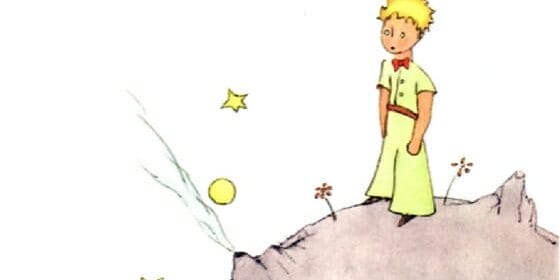The Playground Theatre has announced its first Christmas show with the world premiere of a new stage production of the much-loved French children’s novella The Little Prince.
Written by pioneering pilot Antoine de Saint-Exupéry, The Little Prince tells an extraordinary tale about childhood, friendship, love, loss and faith. The novella is the most widely translated book ever, after the Bible. It has been translated into 300 languages and dialects and, in France, it has been voted the best book of the 20th Century.
In this new translation by Ros and Chloe Schwartz, The Little Prince is performed by London based German actor/director Martin Oelbermann. Employing circus, physical theatre and a minimalist approach, the work invites its audience to stay true to their childhood dreams and to carefully protect the inner child.
We spoke to Martin to find out more.
You’re directing and performing in The Little Prince at The Playground Theatre, what can you tell us about it?
The Little Prince is a very famous and very beautiful book by the French author Antoine de Saint-Exupéry; it was written in 1942 and, like some of the great children’s stories, it is also much loved by adults. It tells the story of a pilot who crashes his plane in the Sahara desert and meets the little prince who comes from a remote little planet and is looking for friends. It is partly biographical; Saint-Exupéry was a pioneering pilot himself, who often crashed his planes and yearned for the lost world of childhood.
What is it about Ros and Chloe Schwartz’s adaptation that appealed to you?
The language flows beautifully, it sounds and feels very fresh and modern, in a timeless way. It has humour and wit and you can’t really tell that it is a translation. It has wonderful rhythms and melodies and lends itself really well to be performed and spoken.
How have you combined minimalism, physical theatre and circus in to the production?
The general approach is minimalist; just one actor/narrator playing all the parts, hopefully inspiring the audience to create the characters in their imagination. Then, in certain sequences, I am using physical theatre and circus elements to change the rhythm of the piece and also to offer more visual ways of telling the story. I try to follow the book and the illustrations which are also more abstract in some places and like cartoons in others. I would love to transfer this diversity in simplicity to the performance.
Why do you think this is a good alternative to traditional pantomime?
Because it goes back to the roots of traditional pantomime! I will be the mime (actor) who plays panto (all the parts). Also, The Little Prince is a fantastic story for the entire family; everyone will be able to relate to it and find meaning and resonance, joy, sadness, comfort and hope. If in our production we manage to stay true to the book, the audience will take away moments which will remain with them for a long time. I am also working with two great designers: the scenographer Alison Neighbour, who is creating a beautiful space and video designer Adam Lansberry, who will bring the illustrations alive as animations.
What do you think makes the story of The Little Prince so well loved?
I think this is because it has so many layers and can be enjoyed in many different ways: for the beautiful drawings, the story of the little prince, the story of the pilot, the silly adults, the humour, as well as for the more reflective passages and its wisdom. You can discover the book as a child and still find new meaning in it as you grow older. On the one had it appears to be quite simple, on the other it is very profound. It’s huge impact is ultimately due, I think, to the fact that Saint-Exupéry manages to keep all these layers in a very organic, fluid balance. It is almost as if The Little Prince is a constellation in itself. It appeals to the adult in the child and to the child in the adult. You are never quite finished with the book, it touches you deeply. It is universal and feels true.
What do you enjoy most about making theatre for children?
What I love most about making theatre for children is that it means so much to them! For many children this might be the first time that they come to the theatre. For them, it is a magical place, a new discovery, something that will stay with them possibly for the rest of their lives. There is a great feeling of responsibility while at the same time a very rewarding feeling in that one can really connect to the audience. Children really look and really listen. In their response, they are totally honest. Like the little prince says: “children understand.”
The Little Prince runs at The Playground Theatre, 8.Latimer Rd, London W10 6RQ from December 15 to January 7- 020 8960 0110 / http://theplaygroundtheatre.london















